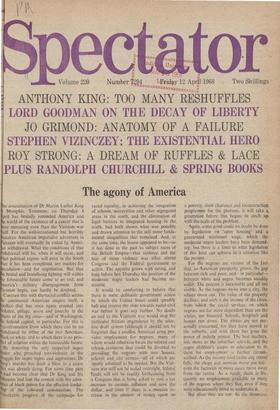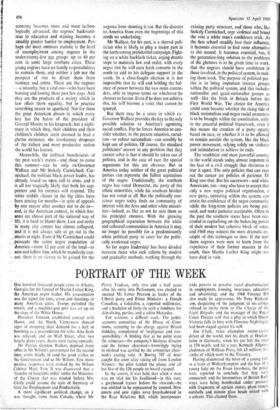The agony of America
he assassination of Dr Martin Luther King Memphis, Tennessee, on Thursday 4 oril has brutally reminded America and e brutal and brutalising fighting will within e foreseeable future come to an end, and merica's military disengagement from ietnam begin, can hardly be doubted. Contrast this with the racial conflict within e .continental American empire itself, a nflict that has once again erupted into Olence, pillage, arson and anarchy in the reels of the big cities-and of Washington, racial equality, in achieving the integration of schools,' universities and other segregated areas in the south, and the elimination of legal barriers to integrated housing in the north. had both shown what was possible and drawn attention to the still more funda- mental inequalities that remained. And, at the same time, the lesson appeared to be—as. it has done in the past to subject races of the British Empire---Lthat violence and the fear of more violence was what stirred Congress and the Federal government to action. The appetite grows with eating, and long before last Thursday the position of the moderate negro leaders had become un- tenable.
It would he comforting to believe that there is some definable government action by which the United States could speedily halt and reverse the slide towards racial civil war before it goes any further. No doubt an end to the Vietnam war would stop the particular friction engendered by the selec-. tive draft system (although it should not be forgotten that a swollen American army pro. vides employment for negroes, many of• whom would otherwise be on the streets) and release resources that could he diverted to providing the negroes with new 'houses, schools and city centres—all of which arc openly admitted to be needed. But the Viet-. nam war will not he ended overnight, federal funds will not he readily forthcoming from a Congress that is being asked to vote 'a tax increase to contain inflation and save the dollar, and -even • if there is a massive in- crease in the amount . of money spent on a poverty. slum clearance and reconstruction programme for the ghettoes, it will take a generation before this begins to catch up with the scale of the problem.
Again, some good could no doubt be done by legislation on 'open housing' and a guaranteed minimum - wage, which the moderate negro leaders have been demand- ing; but 'there is a limit to what legislation_ of this kind can achieve in a situation like the present.
For the negroes are victims of the fact that, as American prosperity grows, the gap between rich and poor; and—in particular— between white and negro, becomes steadily wider. The process is inexorable and all too visible. As the negroes move into a city, the whites move out. The value of the property declines, and with it the income of the cities,- from which the social services, on which negroes are far more dependent than are the whites, are financed. Schools, hospitals and • houses run down. The whites are not per- . sonally concerned, for they have moved to the suburbs, and with them has gone the power of orderly protest. The best teachers, economy becomes more and more techno- logically advanced, the negroes' backward- ness in education and training becomes a steadily greater barrier to employment. Per- haps the most ominous statistic is the level of unemployment among negroes in the under-twenty-eve age group: up to 40 per cent in some large northern cities. These young negroes have no family responsibilities to restrain them, and neither a job nor the prospect of one to divert them from violence and crime. These are the negroes —a minority, but a vital one—who have been burning and looting these past few days. And they are the products of a society which in law offers them equality, but in practice something nearer to apartheid. Not for them the great American dream in which every boy has the baton of the president of General Motors in his knapsack; but a night- mare in which they, their children and their children's children seem doomed to lead a ghetto existence, the involuntary dropouts of the richest and most productive nation the world has known.
Meanwhile, the political beneficiaries of • the past week's events—and those to come this summer—can be only ex-Governor Wallace and Mr Stokely Carmichael. Car- michael, the militant black power leader, has already issued an open call to arms, and it is all too tragically likely that both his sup- porters and his enemies will respond. The white middle classes in the big cities have been arming for months—in spite of appeals by one mayor after another not to do so— and, in the American context, in which fire- . arms are almost part of the national way of ' • life, it is hard to blame them. Law and order in many city centres has • almost collapsed, *and it is not always safe to go out in the greets at night. Even if Mr Carmichael could persuade the entire negro population of America—some 12 per cent of the total—to ann and follow him, which he manifestly can- ,- not, there is no victory to be gained for the negroes from shooting it out. But the disaster to America from even the beginnings of this needs no underlining.
Mr Wallace, for his part, is a shrewd poli- tician who is likely to play a major part in the forthcoming presidential campaign. Fight- ing on a white backlash ticket, urging drastic steps to maintain law and order, with every negro riot he will earn fresh converts in the north to add to his delegate support in the south. In a close-fought election it is not impossible that he will end holding the bal- ance of power between the two main conten- ders, able to impose terms on whichever he chooses to favour. Even if he does not achieve this, his will become a voice that cannot be ignored.
But there may be a sense in which ex- Governor Wallace provides the key to the only possible solution to America's agonising racial conflict. For he forces America to con- sider whether, in the present situation, racial- ism—or colour nationalism—can sensibly be kept out of politics. Of course, the standard politicians' answer to any problem that they cannot solve is that it should be taken out of politics, and in the case of race the special arguments for this are obvious. But in America today neither of the great political parties can represent the fullest aspirations of the negro. Traditionally, the northern negro has voted Democrat, the party of the ethnic minorities, while his southern brother has not voted at all. But the politically con- scious negro today finds no community of interest with the Jews and other white minori- ties—indeed, as like as not he sees them as his principal enemies. With the growing geographical separation between the white and coloured communities in America it may no longer be pOssibI6 for a predominantly white political party to cater for the politi- cally awakened negro. So far negro leadership has been divided between those who seek reform by modest and gradualist methods, working through the existing party structure, and -those who, like Stokely Carmichael, urge violence and brand the vote a white man's confidence trick. As the first school steadily lose their influence, it becomes essential to find some alternative to the second. It becomes essential, too, if the generation-long solution to the problems of the ghettoes is to be given time to work, that the negroes should have confidence in those involved, in the political system, in mak- ing them work. The purpose of political par- ties is to bring important interest groups within the political system, and this includes nationalist and quasi-nationalist groups as well—like the Irish in Britain before the First World War. The choice for America could soon become whether the rising' tide of black nationalism and negro racial awareness is to be brought within the constitution, with- in the peaceful political framework, even if this means the creation of a 'party openly based on race, or whether it is to be allowed to remain outside the system, lilce the black power movement, relying solely on violence and intimidation to achieve its-ends.
The wealthiest and most powerful country in the world stands today almost impotent in the face of a civil struggle that threatens to tear it apart. The only policies that can root out the cancer are policies of patience. Dr King saw that. But his successors—and white Americans, too—may also have to accept that only a new negro political organisation, a new party, operating within the system, can retain the confidence of the negro community while the long-term policies are being pur- sued, and make patienceacceptable. Often in the .past. the southern states. have been suc- cessful in capitalising on the balancing power of their modest but cohesive block of votes, and 1968 may witness• the most dramatic ex- ample of this technique to date.- If the nor- thern negroes were now to leant from the experience of their fornier masters in the south, then Martin Luther King might not have died in vain.











































 Previous page
Previous page